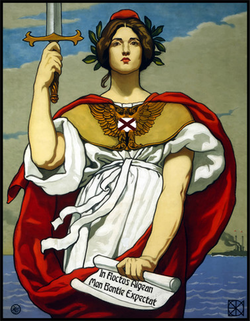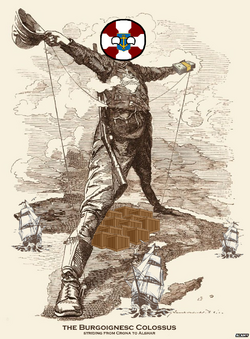Bourgeoisie Burgoignesc
| This article is part of a series on the |
| Culture in Burgundie |
|---|
 |
| Society |
| Arts and literature |
| Other |
|
Burgundie portal |
The bourgeoisie (Burg|burgesie) is a legal term from the Middle Ages referring to the inhabitants having the rights of citizenship and political rights in a city (see City Rights and Town Privileges in Dericania). While the legal distinction remains in Burgundie, the reference is now a more general term to describe the people of the city, as opposed to those of rural areas. It is most commonly used in lay speech to refer to people with a certain cultural and financial capital belonging to the middle or upper middle class: the upper (haute), middle (moyenne), and petty (petite) bourgeoisie (which are collectively designated "the bourgeoisie"); an affluent and often opulent stratum of the middle class who stand opposite the proletariat class.
The "burgesie" in its original sense is intimately linked to the existence of cities recognized as such by their urban charters (e.g. municipal charter, town privileges), so there was no bourgeoisie "outside the walls of the city" beyond which the people were "peasants" submitted to the stately courts and manorialism (except for the traveling "fair bourgeoisie" living outside urban territories, who retained their city rights and domicile).
In certain socialist philosophy, the bourgeoisie is the social class that came to own the means of production during modern industrialization and whose societal concerns are the value of property and the preservation of capital to ensure the perpetuation of their economic supremacy in society. This definition is explicitly absent from Burgoignesc legal and academic writing as welfare capitalism is consistently seen to disprove the existence of a perpetual class conflict.
History
Impact on society
Impact on the economy
| This article is part of a series on the |
| Economy of Burgundie |
|---|
 |
| Economy |
| Policies |
| Alliances and Trade Agreements |
| History and culture |
| Key components |
|
Burgundie portal |
The role of conspicuous consumption cannot be overstated in the Economy of Burgundie. After the collapse of the feudal order in Burgundie, and the rise of cities and eventually the industrial revolution a Burgoignesc middle class emerged, primarily made up of the merchant class, but also of skilled craftsmen. The Burgoigniacs filling the middle classes took on more and more real property and capital as the nobility and Church lost land and power. These culminated in the First Fratricide at which point the bishoprics of Burgundie were finally removed and the nobility abolished.